Leadership, Management, and Operations at Morrisons: A Report
VerifiedAdded on 2023/01/09
|17
|5091
|21
Report
AI Summary
This report examines the roles and characteristics of leaders and managers, comparing them within the context of Morrisons, a major UK supermarket chain. It analyzes the differences in their functions, such as planning, organizing, and directing, and how these roles play out in performance and change management scenarios. The report also delves into leadership and management theories, including classical theory, democratic leadership, systems leadership, situational leadership, and management by objectives, evaluating their advantages and disadvantages for Morrisons. Furthermore, it explores the significance of operations management in achieving business objectives and the impact of external environmental factors on decision-making. The conclusion summarizes the key findings and implications of the analysis.
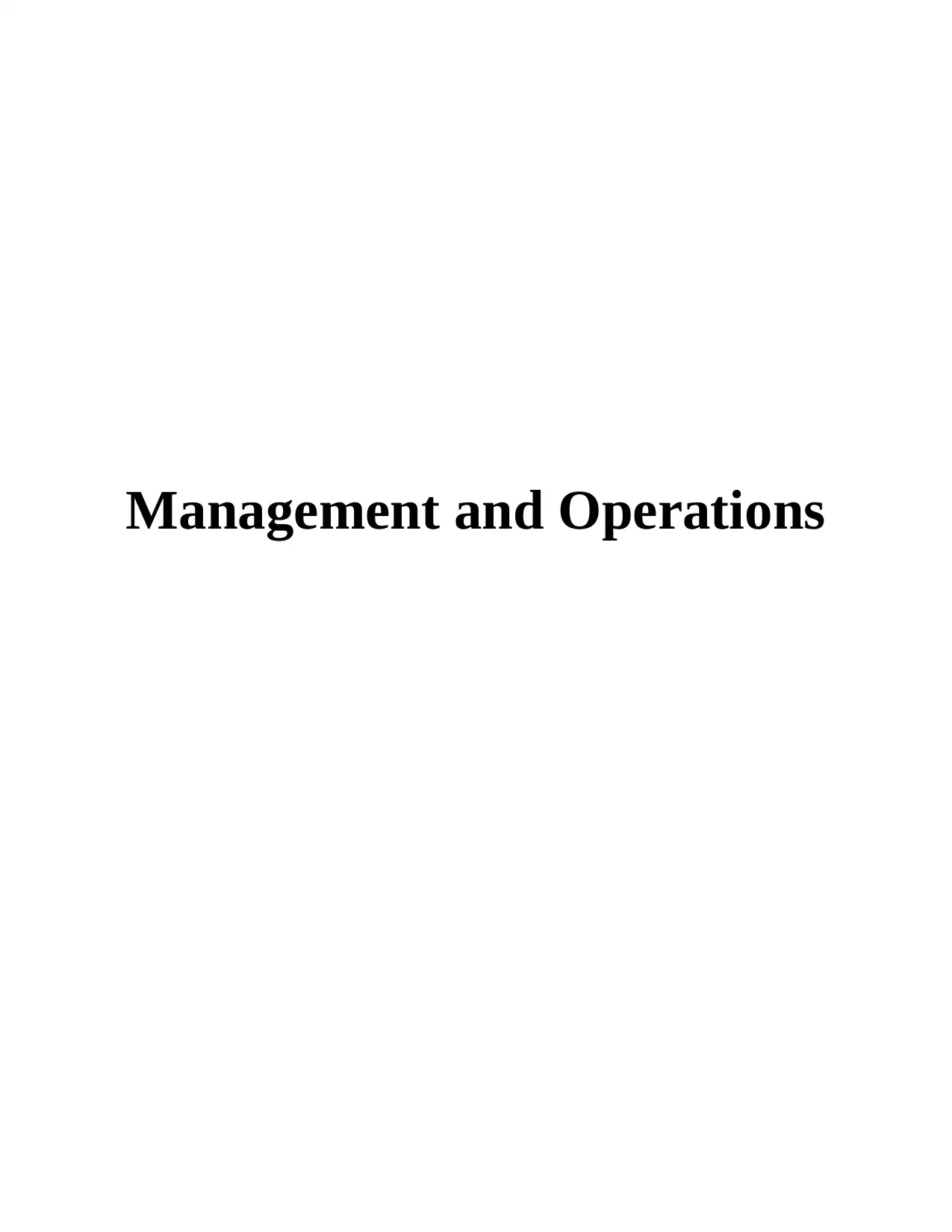
Management and Operations
Paraphrase This Document
Need a fresh take? Get an instant paraphrase of this document with our AI Paraphraser
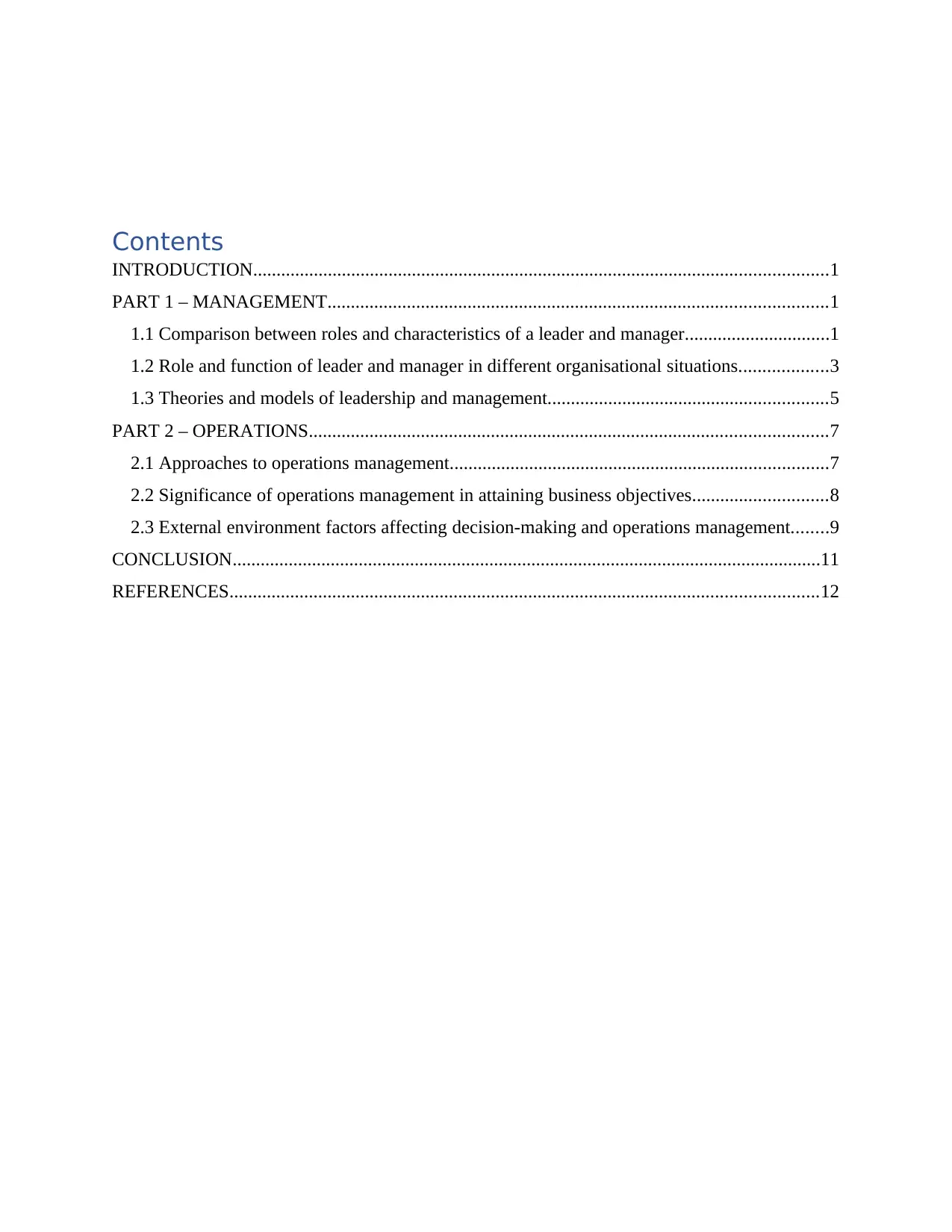
Contents
INTRODUCTION...........................................................................................................................1
PART 1 – MANAGEMENT...........................................................................................................1
1.1 Comparison between roles and characteristics of a leader and manager...............................1
1.2 Role and function of leader and manager in different organisational situations...................3
1.3 Theories and models of leadership and management............................................................5
PART 2 – OPERATIONS...............................................................................................................7
2.1 Approaches to operations management.................................................................................7
2.2 Significance of operations management in attaining business objectives.............................8
2.3 External environment factors affecting decision-making and operations management........9
CONCLUSION..............................................................................................................................11
REFERENCES..............................................................................................................................12
INTRODUCTION...........................................................................................................................1
PART 1 – MANAGEMENT...........................................................................................................1
1.1 Comparison between roles and characteristics of a leader and manager...............................1
1.2 Role and function of leader and manager in different organisational situations...................3
1.3 Theories and models of leadership and management............................................................5
PART 2 – OPERATIONS...............................................................................................................7
2.1 Approaches to operations management.................................................................................7
2.2 Significance of operations management in attaining business objectives.............................8
2.3 External environment factors affecting decision-making and operations management........9
CONCLUSION..............................................................................................................................11
REFERENCES..............................................................................................................................12

⊘ This is a preview!⊘
Do you want full access?
Subscribe today to unlock all pages.

Trusted by 1+ million students worldwide
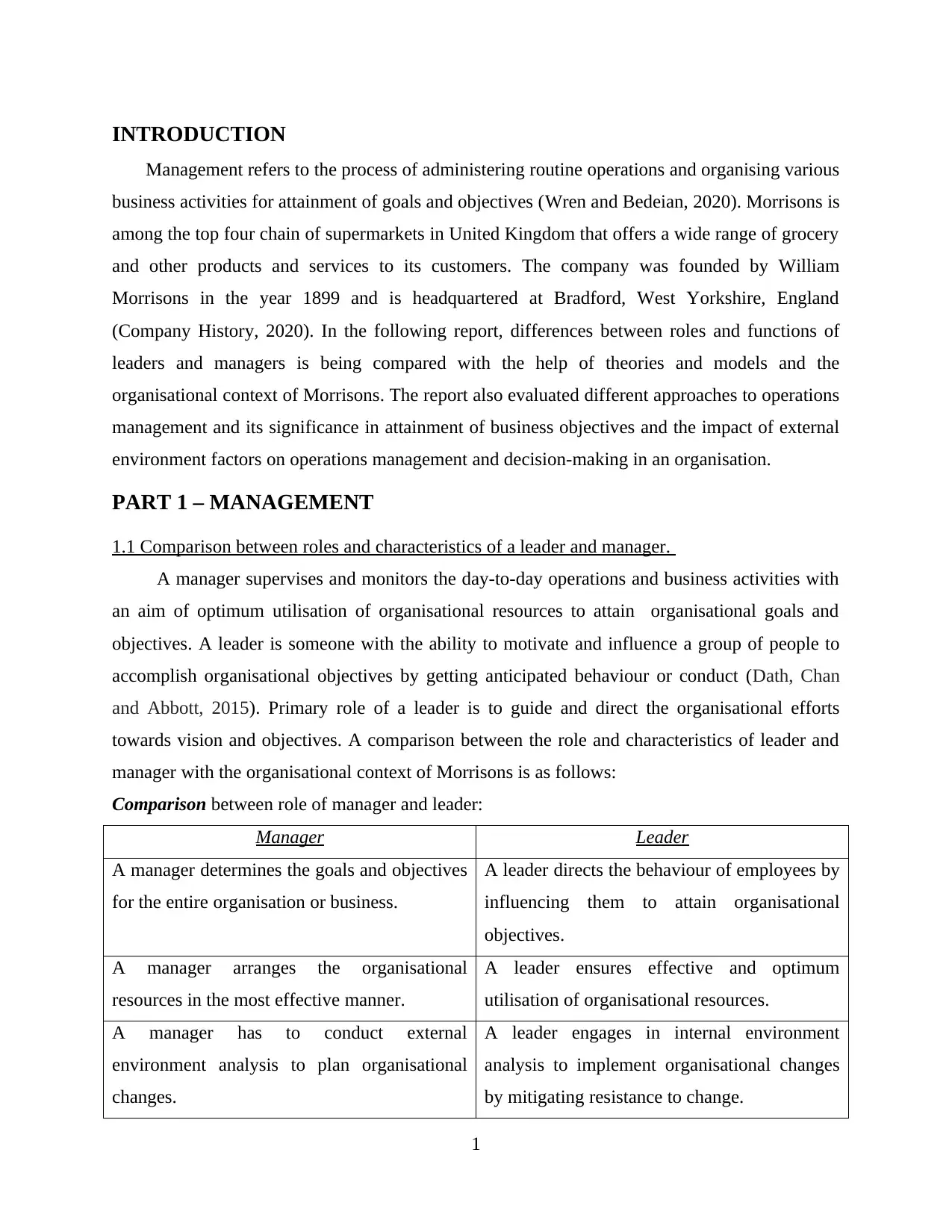
INTRODUCTION
Management refers to the process of administering routine operations and organising various
business activities for attainment of goals and objectives (Wren and Bedeian, 2020). Morrisons is
among the top four chain of supermarkets in United Kingdom that offers a wide range of grocery
and other products and services to its customers. The company was founded by William
Morrisons in the year 1899 and is headquartered at Bradford, West Yorkshire, England
(Company History, 2020). In the following report, differences between roles and functions of
leaders and managers is being compared with the help of theories and models and the
organisational context of Morrisons. The report also evaluated different approaches to operations
management and its significance in attainment of business objectives and the impact of external
environment factors on operations management and decision-making in an organisation.
PART 1 – MANAGEMENT
1.1 Comparison between roles and characteristics of a leader and manager.
A manager supervises and monitors the day-to-day operations and business activities with
an aim of optimum utilisation of organisational resources to attain organisational goals and
objectives. A leader is someone with the ability to motivate and influence a group of people to
accomplish organisational objectives by getting anticipated behaviour or conduct (Dath, Chan
and Abbott, 2015). Primary role of a leader is to guide and direct the organisational efforts
towards vision and objectives. A comparison between the role and characteristics of leader and
manager with the organisational context of Morrisons is as follows:
Comparison between role of manager and leader:
Manager Leader
A manager determines the goals and objectives
for the entire organisation or business.
A leader directs the behaviour of employees by
influencing them to attain organisational
objectives.
A manager arranges the organisational
resources in the most effective manner.
A leader ensures effective and optimum
utilisation of organisational resources.
A manager has to conduct external
environment analysis to plan organisational
changes.
A leader engages in internal environment
analysis to implement organisational changes
by mitigating resistance to change.
1
Management refers to the process of administering routine operations and organising various
business activities for attainment of goals and objectives (Wren and Bedeian, 2020). Morrisons is
among the top four chain of supermarkets in United Kingdom that offers a wide range of grocery
and other products and services to its customers. The company was founded by William
Morrisons in the year 1899 and is headquartered at Bradford, West Yorkshire, England
(Company History, 2020). In the following report, differences between roles and functions of
leaders and managers is being compared with the help of theories and models and the
organisational context of Morrisons. The report also evaluated different approaches to operations
management and its significance in attainment of business objectives and the impact of external
environment factors on operations management and decision-making in an organisation.
PART 1 – MANAGEMENT
1.1 Comparison between roles and characteristics of a leader and manager.
A manager supervises and monitors the day-to-day operations and business activities with
an aim of optimum utilisation of organisational resources to attain organisational goals and
objectives. A leader is someone with the ability to motivate and influence a group of people to
accomplish organisational objectives by getting anticipated behaviour or conduct (Dath, Chan
and Abbott, 2015). Primary role of a leader is to guide and direct the organisational efforts
towards vision and objectives. A comparison between the role and characteristics of leader and
manager with the organisational context of Morrisons is as follows:
Comparison between role of manager and leader:
Manager Leader
A manager determines the goals and objectives
for the entire organisation or business.
A leader directs the behaviour of employees by
influencing them to attain organisational
objectives.
A manager arranges the organisational
resources in the most effective manner.
A leader ensures effective and optimum
utilisation of organisational resources.
A manager has to conduct external
environment analysis to plan organisational
changes.
A leader engages in internal environment
analysis to implement organisational changes
by mitigating resistance to change.
1
Paraphrase This Document
Need a fresh take? Get an instant paraphrase of this document with our AI Paraphraser
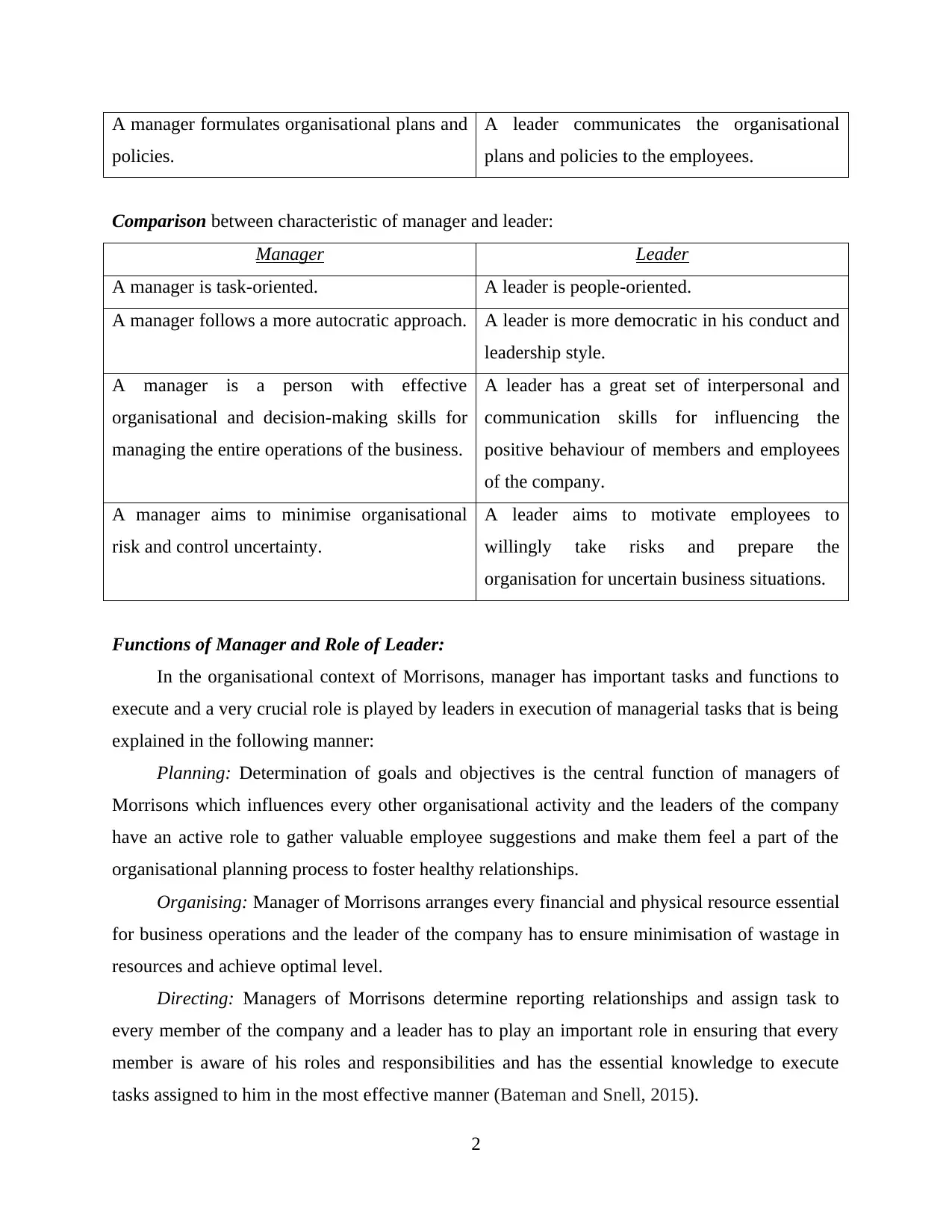
A manager formulates organisational plans and
policies.
A leader communicates the organisational
plans and policies to the employees.
Comparison between characteristic of manager and leader:
Manager Leader
A manager is task-oriented. A leader is people-oriented.
A manager follows a more autocratic approach. A leader is more democratic in his conduct and
leadership style.
A manager is a person with effective
organisational and decision-making skills for
managing the entire operations of the business.
A leader has a great set of interpersonal and
communication skills for influencing the
positive behaviour of members and employees
of the company.
A manager aims to minimise organisational
risk and control uncertainty.
A leader aims to motivate employees to
willingly take risks and prepare the
organisation for uncertain business situations.
Functions of Manager and Role of Leader:
In the organisational context of Morrisons, manager has important tasks and functions to
execute and a very crucial role is played by leaders in execution of managerial tasks that is being
explained in the following manner:
Planning: Determination of goals and objectives is the central function of managers of
Morrisons which influences every other organisational activity and the leaders of the company
have an active role to gather valuable employee suggestions and make them feel a part of the
organisational planning process to foster healthy relationships.
Organising: Manager of Morrisons arranges every financial and physical resource essential
for business operations and the leader of the company has to ensure minimisation of wastage in
resources and achieve optimal level.
Directing: Managers of Morrisons determine reporting relationships and assign task to
every member of the company and a leader has to play an important role in ensuring that every
member is aware of his roles and responsibilities and has the essential knowledge to execute
tasks assigned to him in the most effective manner (Bateman and Snell, 2015).
2
policies.
A leader communicates the organisational
plans and policies to the employees.
Comparison between characteristic of manager and leader:
Manager Leader
A manager is task-oriented. A leader is people-oriented.
A manager follows a more autocratic approach. A leader is more democratic in his conduct and
leadership style.
A manager is a person with effective
organisational and decision-making skills for
managing the entire operations of the business.
A leader has a great set of interpersonal and
communication skills for influencing the
positive behaviour of members and employees
of the company.
A manager aims to minimise organisational
risk and control uncertainty.
A leader aims to motivate employees to
willingly take risks and prepare the
organisation for uncertain business situations.
Functions of Manager and Role of Leader:
In the organisational context of Morrisons, manager has important tasks and functions to
execute and a very crucial role is played by leaders in execution of managerial tasks that is being
explained in the following manner:
Planning: Determination of goals and objectives is the central function of managers of
Morrisons which influences every other organisational activity and the leaders of the company
have an active role to gather valuable employee suggestions and make them feel a part of the
organisational planning process to foster healthy relationships.
Organising: Manager of Morrisons arranges every financial and physical resource essential
for business operations and the leader of the company has to ensure minimisation of wastage in
resources and achieve optimal level.
Directing: Managers of Morrisons determine reporting relationships and assign task to
every member of the company and a leader has to play an important role in ensuring that every
member is aware of his roles and responsibilities and has the essential knowledge to execute
tasks assigned to him in the most effective manner (Bateman and Snell, 2015).
2
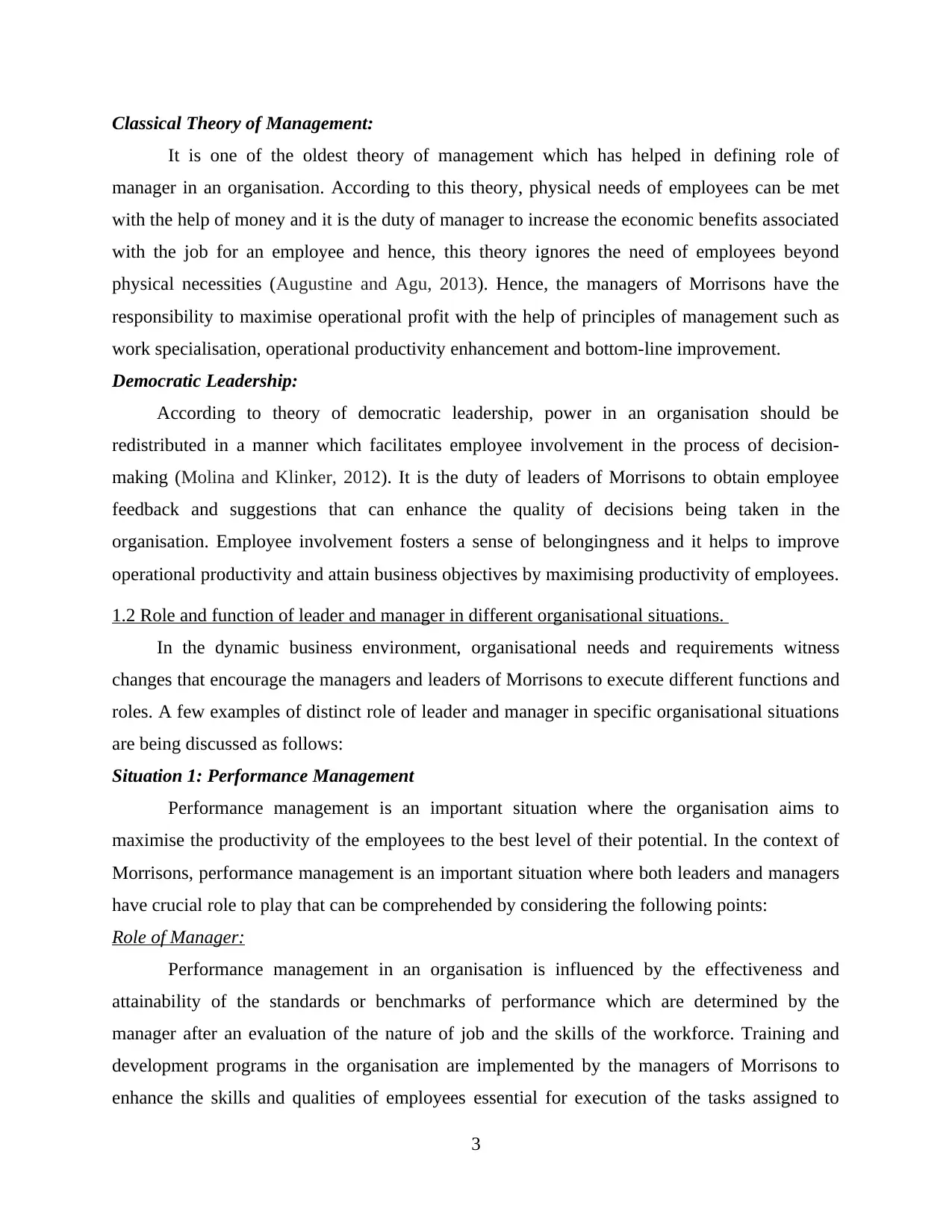
Classical Theory of Management:
It is one of the oldest theory of management which has helped in defining role of
manager in an organisation. According to this theory, physical needs of employees can be met
with the help of money and it is the duty of manager to increase the economic benefits associated
with the job for an employee and hence, this theory ignores the need of employees beyond
physical necessities (Augustine and Agu, 2013). Hence, the managers of Morrisons have the
responsibility to maximise operational profit with the help of principles of management such as
work specialisation, operational productivity enhancement and bottom-line improvement.
Democratic Leadership:
According to theory of democratic leadership, power in an organisation should be
redistributed in a manner which facilitates employee involvement in the process of decision-
making (Molina and Klinker, 2012). It is the duty of leaders of Morrisons to obtain employee
feedback and suggestions that can enhance the quality of decisions being taken in the
organisation. Employee involvement fosters a sense of belongingness and it helps to improve
operational productivity and attain business objectives by maximising productivity of employees.
1.2 Role and function of leader and manager in different organisational situations.
In the dynamic business environment, organisational needs and requirements witness
changes that encourage the managers and leaders of Morrisons to execute different functions and
roles. A few examples of distinct role of leader and manager in specific organisational situations
are being discussed as follows:
Situation 1: Performance Management
Performance management is an important situation where the organisation aims to
maximise the productivity of the employees to the best level of their potential. In the context of
Morrisons, performance management is an important situation where both leaders and managers
have crucial role to play that can be comprehended by considering the following points:
Role of Manager:
Performance management in an organisation is influenced by the effectiveness and
attainability of the standards or benchmarks of performance which are determined by the
manager after an evaluation of the nature of job and the skills of the workforce. Training and
development programs in the organisation are implemented by the managers of Morrisons to
enhance the skills and qualities of employees essential for execution of the tasks assigned to
3
It is one of the oldest theory of management which has helped in defining role of
manager in an organisation. According to this theory, physical needs of employees can be met
with the help of money and it is the duty of manager to increase the economic benefits associated
with the job for an employee and hence, this theory ignores the need of employees beyond
physical necessities (Augustine and Agu, 2013). Hence, the managers of Morrisons have the
responsibility to maximise operational profit with the help of principles of management such as
work specialisation, operational productivity enhancement and bottom-line improvement.
Democratic Leadership:
According to theory of democratic leadership, power in an organisation should be
redistributed in a manner which facilitates employee involvement in the process of decision-
making (Molina and Klinker, 2012). It is the duty of leaders of Morrisons to obtain employee
feedback and suggestions that can enhance the quality of decisions being taken in the
organisation. Employee involvement fosters a sense of belongingness and it helps to improve
operational productivity and attain business objectives by maximising productivity of employees.
1.2 Role and function of leader and manager in different organisational situations.
In the dynamic business environment, organisational needs and requirements witness
changes that encourage the managers and leaders of Morrisons to execute different functions and
roles. A few examples of distinct role of leader and manager in specific organisational situations
are being discussed as follows:
Situation 1: Performance Management
Performance management is an important situation where the organisation aims to
maximise the productivity of the employees to the best level of their potential. In the context of
Morrisons, performance management is an important situation where both leaders and managers
have crucial role to play that can be comprehended by considering the following points:
Role of Manager:
Performance management in an organisation is influenced by the effectiveness and
attainability of the standards or benchmarks of performance which are determined by the
manager after an evaluation of the nature of job and the skills of the workforce. Training and
development programs in the organisation are implemented by the managers of Morrisons to
enhance the skills and qualities of employees essential for execution of the tasks assigned to
3
⊘ This is a preview!⊘
Do you want full access?
Subscribe today to unlock all pages.

Trusted by 1+ million students worldwide
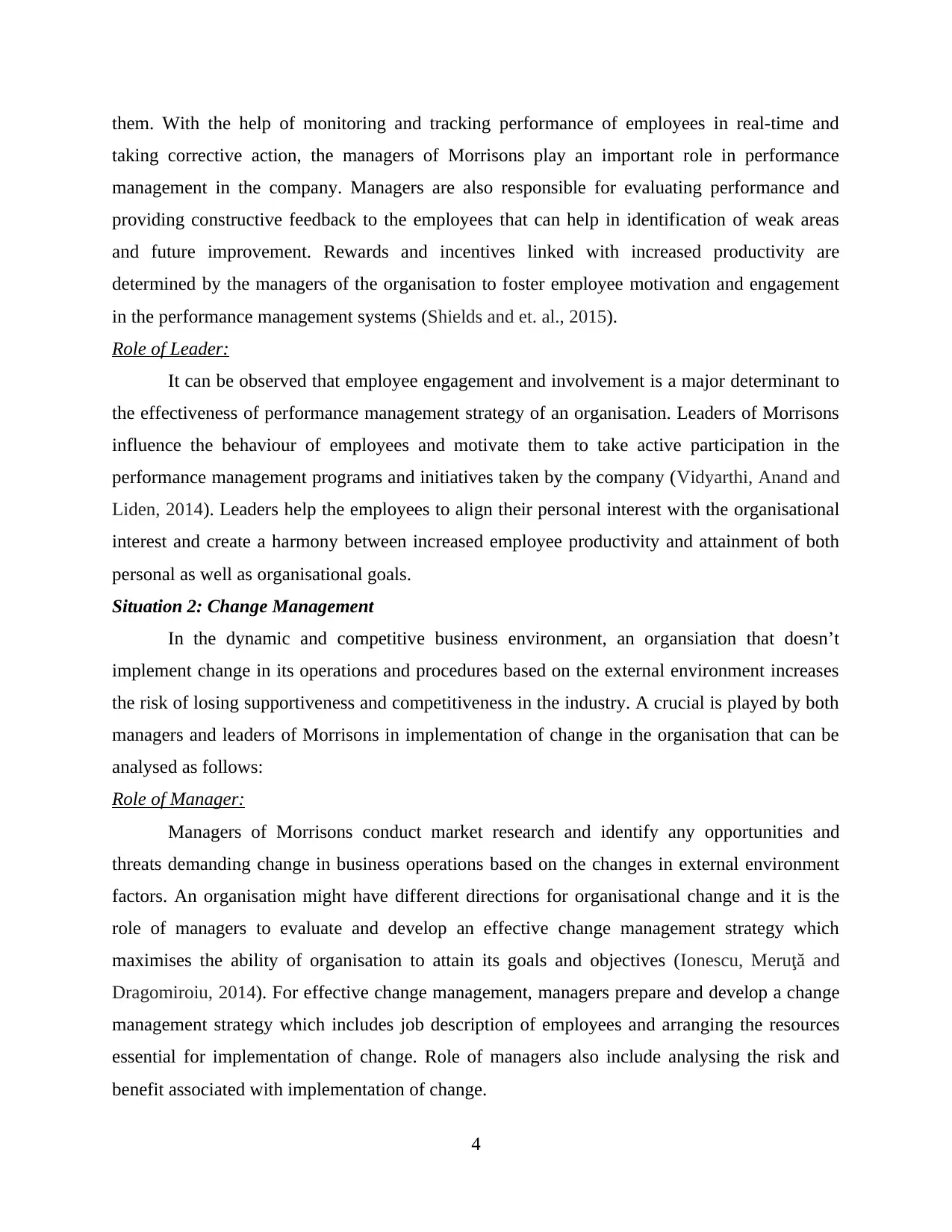
them. With the help of monitoring and tracking performance of employees in real-time and
taking corrective action, the managers of Morrisons play an important role in performance
management in the company. Managers are also responsible for evaluating performance and
providing constructive feedback to the employees that can help in identification of weak areas
and future improvement. Rewards and incentives linked with increased productivity are
determined by the managers of the organisation to foster employee motivation and engagement
in the performance management systems (Shields and et. al., 2015).
Role of Leader:
It can be observed that employee engagement and involvement is a major determinant to
the effectiveness of performance management strategy of an organisation. Leaders of Morrisons
influence the behaviour of employees and motivate them to take active participation in the
performance management programs and initiatives taken by the company (Vidyarthi, Anand and
Liden, 2014). Leaders help the employees to align their personal interest with the organisational
interest and create a harmony between increased employee productivity and attainment of both
personal as well as organisational goals.
Situation 2: Change Management
In the dynamic and competitive business environment, an organsiation that doesn’t
implement change in its operations and procedures based on the external environment increases
the risk of losing supportiveness and competitiveness in the industry. A crucial is played by both
managers and leaders of Morrisons in implementation of change in the organisation that can be
analysed as follows:
Role of Manager:
Managers of Morrisons conduct market research and identify any opportunities and
threats demanding change in business operations based on the changes in external environment
factors. An organisation might have different directions for organisational change and it is the
role of managers to evaluate and develop an effective change management strategy which
maximises the ability of organisation to attain its goals and objectives (Ionescu, Meruţă and
Dragomiroiu, 2014). For effective change management, managers prepare and develop a change
management strategy which includes job description of employees and arranging the resources
essential for implementation of change. Role of managers also include analysing the risk and
benefit associated with implementation of change.
4
taking corrective action, the managers of Morrisons play an important role in performance
management in the company. Managers are also responsible for evaluating performance and
providing constructive feedback to the employees that can help in identification of weak areas
and future improvement. Rewards and incentives linked with increased productivity are
determined by the managers of the organisation to foster employee motivation and engagement
in the performance management systems (Shields and et. al., 2015).
Role of Leader:
It can be observed that employee engagement and involvement is a major determinant to
the effectiveness of performance management strategy of an organisation. Leaders of Morrisons
influence the behaviour of employees and motivate them to take active participation in the
performance management programs and initiatives taken by the company (Vidyarthi, Anand and
Liden, 2014). Leaders help the employees to align their personal interest with the organisational
interest and create a harmony between increased employee productivity and attainment of both
personal as well as organisational goals.
Situation 2: Change Management
In the dynamic and competitive business environment, an organsiation that doesn’t
implement change in its operations and procedures based on the external environment increases
the risk of losing supportiveness and competitiveness in the industry. A crucial is played by both
managers and leaders of Morrisons in implementation of change in the organisation that can be
analysed as follows:
Role of Manager:
Managers of Morrisons conduct market research and identify any opportunities and
threats demanding change in business operations based on the changes in external environment
factors. An organisation might have different directions for organisational change and it is the
role of managers to evaluate and develop an effective change management strategy which
maximises the ability of organisation to attain its goals and objectives (Ionescu, Meruţă and
Dragomiroiu, 2014). For effective change management, managers prepare and develop a change
management strategy which includes job description of employees and arranging the resources
essential for implementation of change. Role of managers also include analysing the risk and
benefit associated with implementation of change.
4
Paraphrase This Document
Need a fresh take? Get an instant paraphrase of this document with our AI Paraphraser
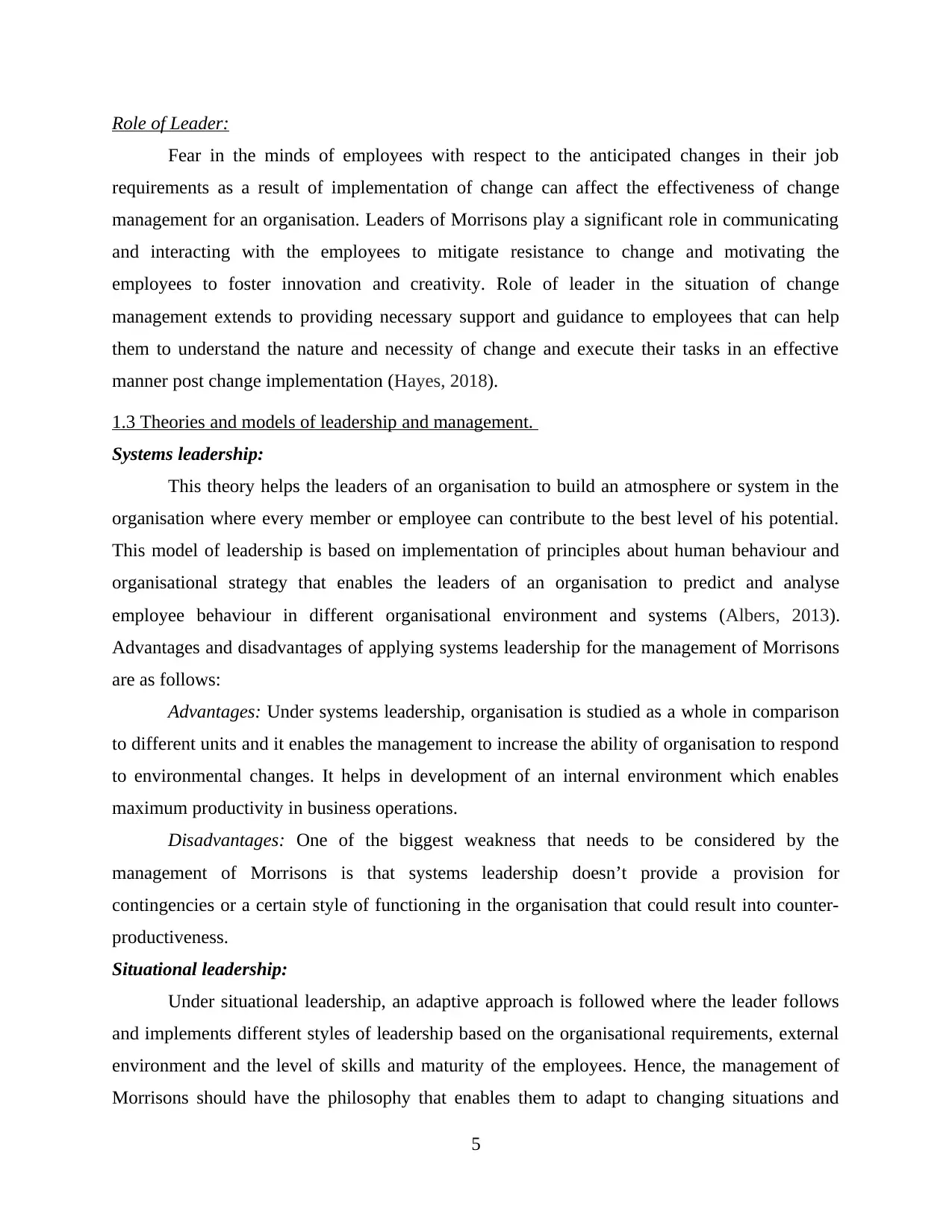
Role of Leader:
Fear in the minds of employees with respect to the anticipated changes in their job
requirements as a result of implementation of change can affect the effectiveness of change
management for an organisation. Leaders of Morrisons play a significant role in communicating
and interacting with the employees to mitigate resistance to change and motivating the
employees to foster innovation and creativity. Role of leader in the situation of change
management extends to providing necessary support and guidance to employees that can help
them to understand the nature and necessity of change and execute their tasks in an effective
manner post change implementation (Hayes, 2018).
1.3 Theories and models of leadership and management.
Systems leadership:
This theory helps the leaders of an organisation to build an atmosphere or system in the
organisation where every member or employee can contribute to the best level of his potential.
This model of leadership is based on implementation of principles about human behaviour and
organisational strategy that enables the leaders of an organisation to predict and analyse
employee behaviour in different organisational environment and systems (Albers, 2013).
Advantages and disadvantages of applying systems leadership for the management of Morrisons
are as follows:
Advantages: Under systems leadership, organisation is studied as a whole in comparison
to different units and it enables the management to increase the ability of organisation to respond
to environmental changes. It helps in development of an internal environment which enables
maximum productivity in business operations.
Disadvantages: One of the biggest weakness that needs to be considered by the
management of Morrisons is that systems leadership doesn’t provide a provision for
contingencies or a certain style of functioning in the organisation that could result into counter-
productiveness.
Situational leadership:
Under situational leadership, an adaptive approach is followed where the leader follows
and implements different styles of leadership based on the organisational requirements, external
environment and the level of skills and maturity of the employees. Hence, the management of
Morrisons should have the philosophy that enables them to adapt to changing situations and
5
Fear in the minds of employees with respect to the anticipated changes in their job
requirements as a result of implementation of change can affect the effectiveness of change
management for an organisation. Leaders of Morrisons play a significant role in communicating
and interacting with the employees to mitigate resistance to change and motivating the
employees to foster innovation and creativity. Role of leader in the situation of change
management extends to providing necessary support and guidance to employees that can help
them to understand the nature and necessity of change and execute their tasks in an effective
manner post change implementation (Hayes, 2018).
1.3 Theories and models of leadership and management.
Systems leadership:
This theory helps the leaders of an organisation to build an atmosphere or system in the
organisation where every member or employee can contribute to the best level of his potential.
This model of leadership is based on implementation of principles about human behaviour and
organisational strategy that enables the leaders of an organisation to predict and analyse
employee behaviour in different organisational environment and systems (Albers, 2013).
Advantages and disadvantages of applying systems leadership for the management of Morrisons
are as follows:
Advantages: Under systems leadership, organisation is studied as a whole in comparison
to different units and it enables the management to increase the ability of organisation to respond
to environmental changes. It helps in development of an internal environment which enables
maximum productivity in business operations.
Disadvantages: One of the biggest weakness that needs to be considered by the
management of Morrisons is that systems leadership doesn’t provide a provision for
contingencies or a certain style of functioning in the organisation that could result into counter-
productiveness.
Situational leadership:
Under situational leadership, an adaptive approach is followed where the leader follows
and implements different styles of leadership based on the organisational requirements, external
environment and the level of skills and maturity of the employees. Hence, the management of
Morrisons should have the philosophy that enables them to adapt to changing situations and
5
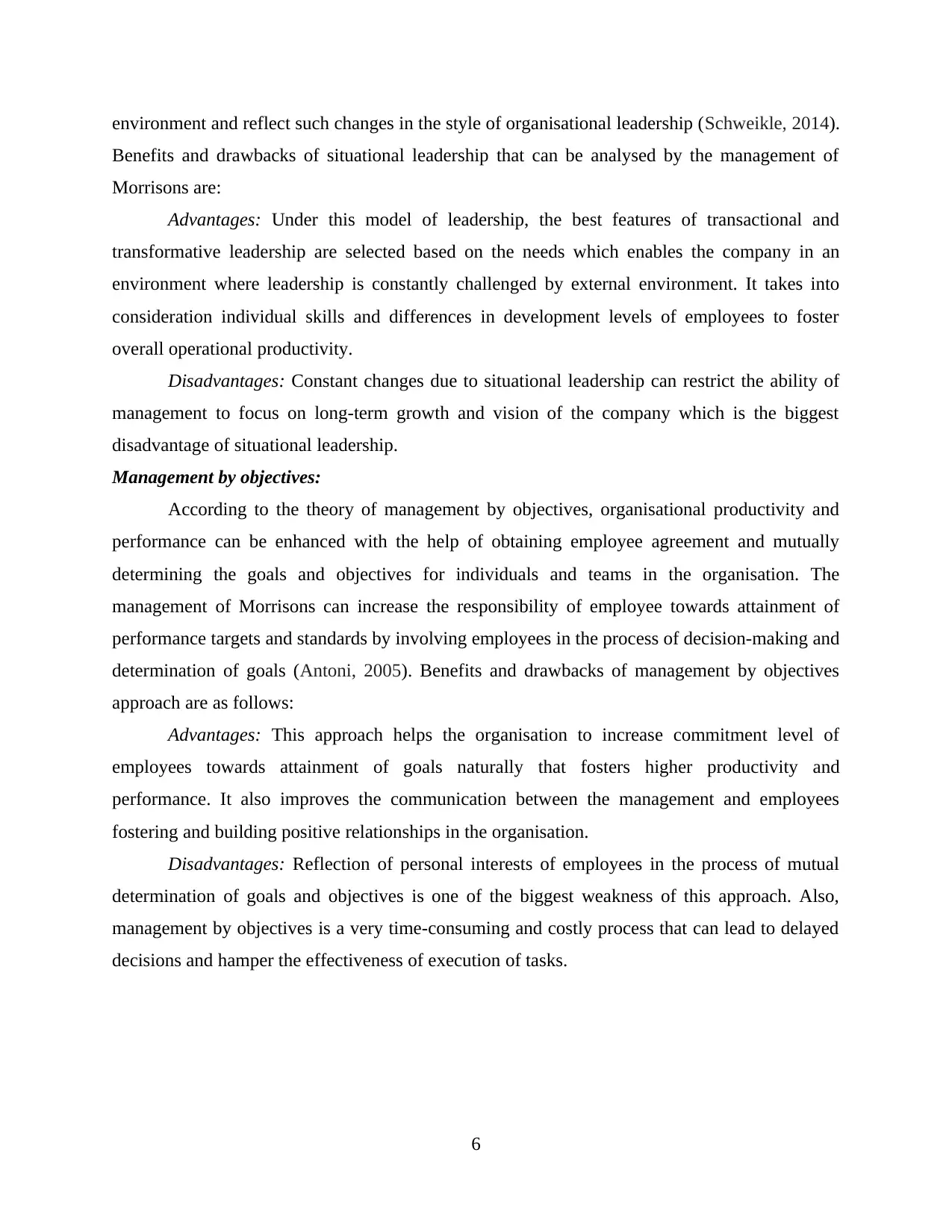
environment and reflect such changes in the style of organisational leadership (Schweikle, 2014).
Benefits and drawbacks of situational leadership that can be analysed by the management of
Morrisons are:
Advantages: Under this model of leadership, the best features of transactional and
transformative leadership are selected based on the needs which enables the company in an
environment where leadership is constantly challenged by external environment. It takes into
consideration individual skills and differences in development levels of employees to foster
overall operational productivity.
Disadvantages: Constant changes due to situational leadership can restrict the ability of
management to focus on long-term growth and vision of the company which is the biggest
disadvantage of situational leadership.
Management by objectives:
According to the theory of management by objectives, organisational productivity and
performance can be enhanced with the help of obtaining employee agreement and mutually
determining the goals and objectives for individuals and teams in the organisation. The
management of Morrisons can increase the responsibility of employee towards attainment of
performance targets and standards by involving employees in the process of decision-making and
determination of goals (Antoni, 2005). Benefits and drawbacks of management by objectives
approach are as follows:
Advantages: This approach helps the organisation to increase commitment level of
employees towards attainment of goals naturally that fosters higher productivity and
performance. It also improves the communication between the management and employees
fostering and building positive relationships in the organisation.
Disadvantages: Reflection of personal interests of employees in the process of mutual
determination of goals and objectives is one of the biggest weakness of this approach. Also,
management by objectives is a very time-consuming and costly process that can lead to delayed
decisions and hamper the effectiveness of execution of tasks.
6
Benefits and drawbacks of situational leadership that can be analysed by the management of
Morrisons are:
Advantages: Under this model of leadership, the best features of transactional and
transformative leadership are selected based on the needs which enables the company in an
environment where leadership is constantly challenged by external environment. It takes into
consideration individual skills and differences in development levels of employees to foster
overall operational productivity.
Disadvantages: Constant changes due to situational leadership can restrict the ability of
management to focus on long-term growth and vision of the company which is the biggest
disadvantage of situational leadership.
Management by objectives:
According to the theory of management by objectives, organisational productivity and
performance can be enhanced with the help of obtaining employee agreement and mutually
determining the goals and objectives for individuals and teams in the organisation. The
management of Morrisons can increase the responsibility of employee towards attainment of
performance targets and standards by involving employees in the process of decision-making and
determination of goals (Antoni, 2005). Benefits and drawbacks of management by objectives
approach are as follows:
Advantages: This approach helps the organisation to increase commitment level of
employees towards attainment of goals naturally that fosters higher productivity and
performance. It also improves the communication between the management and employees
fostering and building positive relationships in the organisation.
Disadvantages: Reflection of personal interests of employees in the process of mutual
determination of goals and objectives is one of the biggest weakness of this approach. Also,
management by objectives is a very time-consuming and costly process that can lead to delayed
decisions and hamper the effectiveness of execution of tasks.
6
⊘ This is a preview!⊘
Do you want full access?
Subscribe today to unlock all pages.

Trusted by 1+ million students worldwide
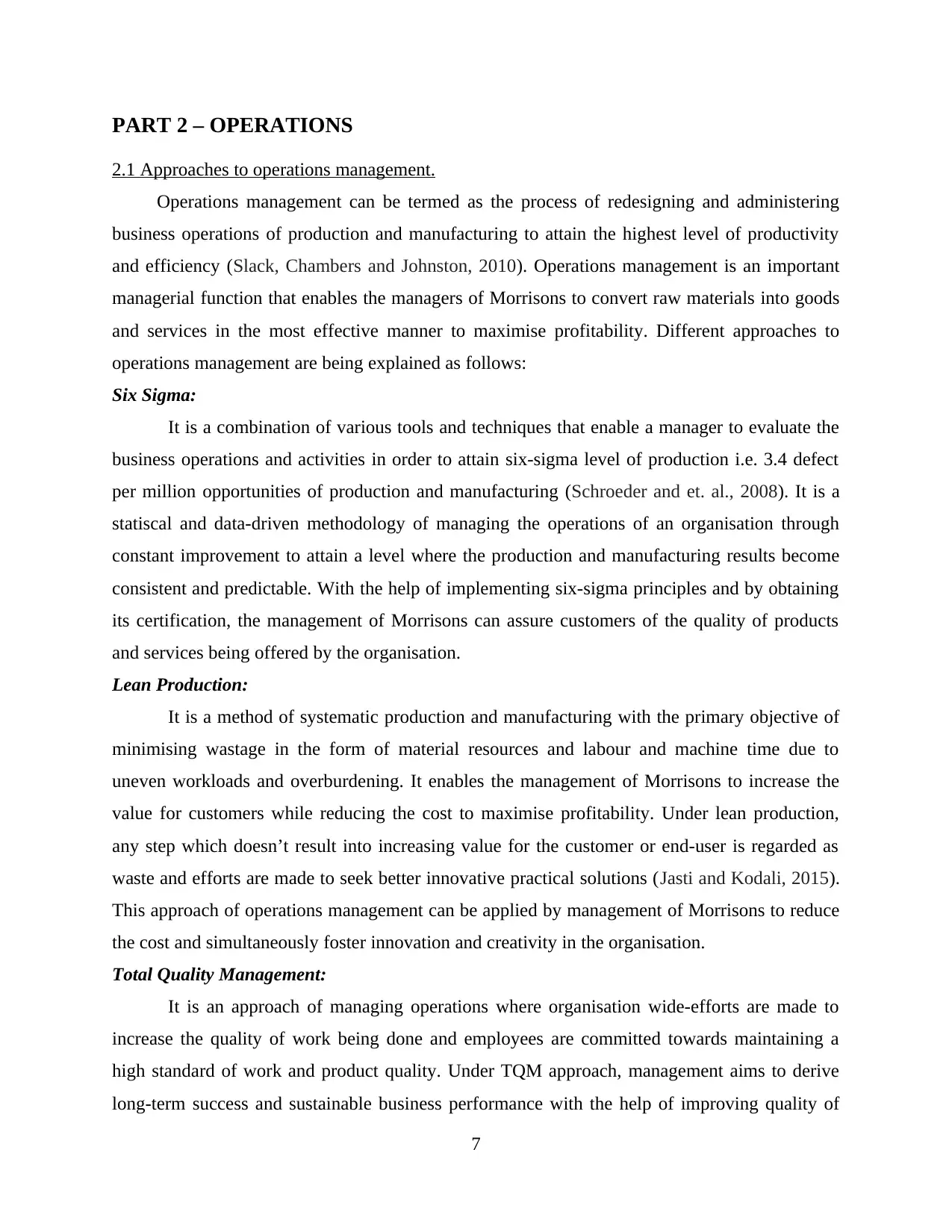
PART 2 – OPERATIONS
2.1 Approaches to operations management.
Operations management can be termed as the process of redesigning and administering
business operations of production and manufacturing to attain the highest level of productivity
and efficiency (Slack, Chambers and Johnston, 2010). Operations management is an important
managerial function that enables the managers of Morrisons to convert raw materials into goods
and services in the most effective manner to maximise profitability. Different approaches to
operations management are being explained as follows:
Six Sigma:
It is a combination of various tools and techniques that enable a manager to evaluate the
business operations and activities in order to attain six-sigma level of production i.e. 3.4 defect
per million opportunities of production and manufacturing (Schroeder and et. al., 2008). It is a
statiscal and data-driven methodology of managing the operations of an organisation through
constant improvement to attain a level where the production and manufacturing results become
consistent and predictable. With the help of implementing six-sigma principles and by obtaining
its certification, the management of Morrisons can assure customers of the quality of products
and services being offered by the organisation.
Lean Production:
It is a method of systematic production and manufacturing with the primary objective of
minimising wastage in the form of material resources and labour and machine time due to
uneven workloads and overburdening. It enables the management of Morrisons to increase the
value for customers while reducing the cost to maximise profitability. Under lean production,
any step which doesn’t result into increasing value for the customer or end-user is regarded as
waste and efforts are made to seek better innovative practical solutions (Jasti and Kodali, 2015).
This approach of operations management can be applied by management of Morrisons to reduce
the cost and simultaneously foster innovation and creativity in the organisation.
Total Quality Management:
It is an approach of managing operations where organisation wide-efforts are made to
increase the quality of work being done and employees are committed towards maintaining a
high standard of work and product quality. Under TQM approach, management aims to derive
long-term success and sustainable business performance with the help of improving quality of
7
2.1 Approaches to operations management.
Operations management can be termed as the process of redesigning and administering
business operations of production and manufacturing to attain the highest level of productivity
and efficiency (Slack, Chambers and Johnston, 2010). Operations management is an important
managerial function that enables the managers of Morrisons to convert raw materials into goods
and services in the most effective manner to maximise profitability. Different approaches to
operations management are being explained as follows:
Six Sigma:
It is a combination of various tools and techniques that enable a manager to evaluate the
business operations and activities in order to attain six-sigma level of production i.e. 3.4 defect
per million opportunities of production and manufacturing (Schroeder and et. al., 2008). It is a
statiscal and data-driven methodology of managing the operations of an organisation through
constant improvement to attain a level where the production and manufacturing results become
consistent and predictable. With the help of implementing six-sigma principles and by obtaining
its certification, the management of Morrisons can assure customers of the quality of products
and services being offered by the organisation.
Lean Production:
It is a method of systematic production and manufacturing with the primary objective of
minimising wastage in the form of material resources and labour and machine time due to
uneven workloads and overburdening. It enables the management of Morrisons to increase the
value for customers while reducing the cost to maximise profitability. Under lean production,
any step which doesn’t result into increasing value for the customer or end-user is regarded as
waste and efforts are made to seek better innovative practical solutions (Jasti and Kodali, 2015).
This approach of operations management can be applied by management of Morrisons to reduce
the cost and simultaneously foster innovation and creativity in the organisation.
Total Quality Management:
It is an approach of managing operations where organisation wide-efforts are made to
increase the quality of work being done and employees are committed towards maintaining a
high standard of work and product quality. Under TQM approach, management aims to derive
long-term success and sustainable business performance with the help of improving quality of
7
Paraphrase This Document
Need a fresh take? Get an instant paraphrase of this document with our AI Paraphraser
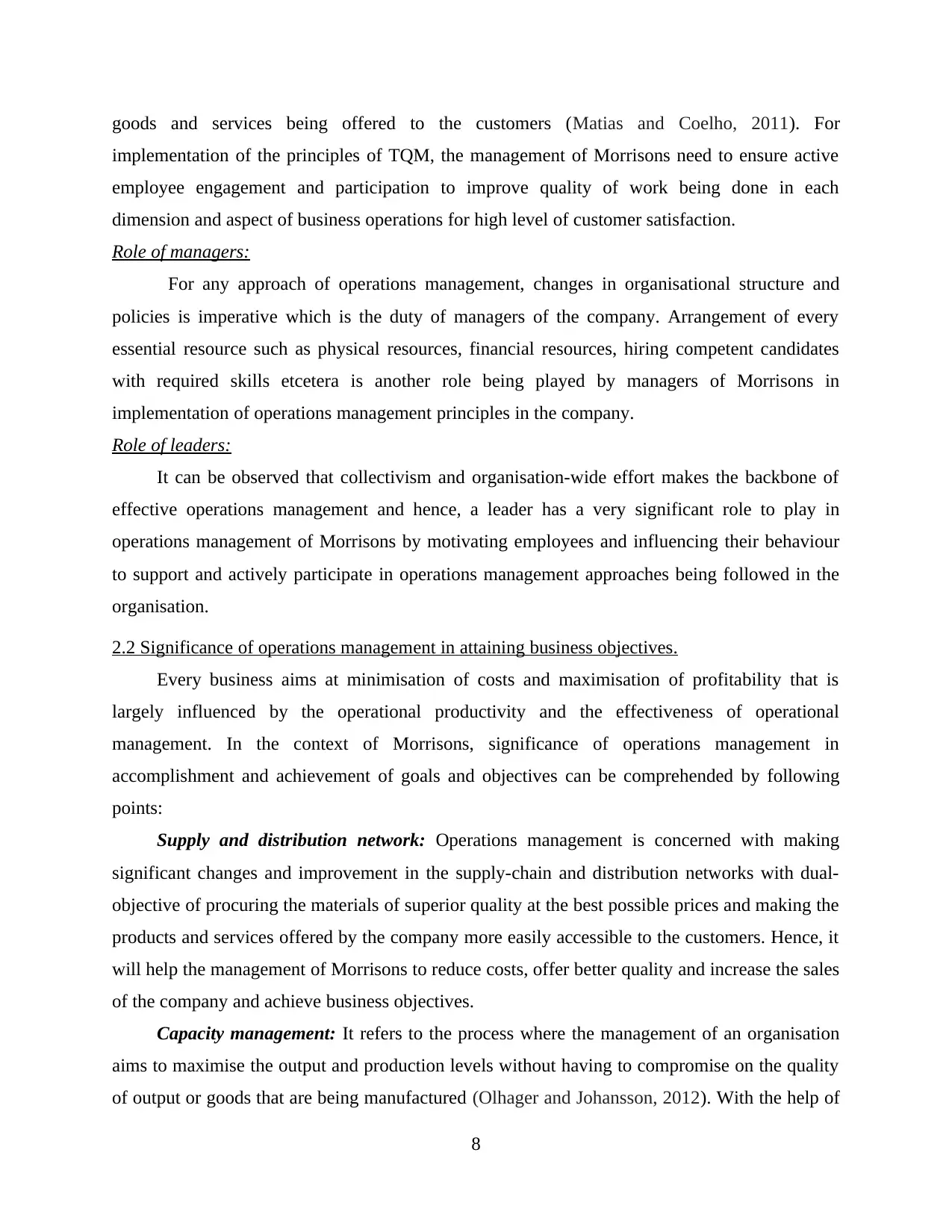
goods and services being offered to the customers (Matias and Coelho, 2011). For
implementation of the principles of TQM, the management of Morrisons need to ensure active
employee engagement and participation to improve quality of work being done in each
dimension and aspect of business operations for high level of customer satisfaction.
Role of managers:
For any approach of operations management, changes in organisational structure and
policies is imperative which is the duty of managers of the company. Arrangement of every
essential resource such as physical resources, financial resources, hiring competent candidates
with required skills etcetera is another role being played by managers of Morrisons in
implementation of operations management principles in the company.
Role of leaders:
It can be observed that collectivism and organisation-wide effort makes the backbone of
effective operations management and hence, a leader has a very significant role to play in
operations management of Morrisons by motivating employees and influencing their behaviour
to support and actively participate in operations management approaches being followed in the
organisation.
2.2 Significance of operations management in attaining business objectives.
Every business aims at minimisation of costs and maximisation of profitability that is
largely influenced by the operational productivity and the effectiveness of operational
management. In the context of Morrisons, significance of operations management in
accomplishment and achievement of goals and objectives can be comprehended by following
points:
Supply and distribution network: Operations management is concerned with making
significant changes and improvement in the supply-chain and distribution networks with dual-
objective of procuring the materials of superior quality at the best possible prices and making the
products and services offered by the company more easily accessible to the customers. Hence, it
will help the management of Morrisons to reduce costs, offer better quality and increase the sales
of the company and achieve business objectives.
Capacity management: It refers to the process where the management of an organisation
aims to maximise the output and production levels without having to compromise on the quality
of output or goods that are being manufactured (Olhager and Johansson, 2012). With the help of
8
implementation of the principles of TQM, the management of Morrisons need to ensure active
employee engagement and participation to improve quality of work being done in each
dimension and aspect of business operations for high level of customer satisfaction.
Role of managers:
For any approach of operations management, changes in organisational structure and
policies is imperative which is the duty of managers of the company. Arrangement of every
essential resource such as physical resources, financial resources, hiring competent candidates
with required skills etcetera is another role being played by managers of Morrisons in
implementation of operations management principles in the company.
Role of leaders:
It can be observed that collectivism and organisation-wide effort makes the backbone of
effective operations management and hence, a leader has a very significant role to play in
operations management of Morrisons by motivating employees and influencing their behaviour
to support and actively participate in operations management approaches being followed in the
organisation.
2.2 Significance of operations management in attaining business objectives.
Every business aims at minimisation of costs and maximisation of profitability that is
largely influenced by the operational productivity and the effectiveness of operational
management. In the context of Morrisons, significance of operations management in
accomplishment and achievement of goals and objectives can be comprehended by following
points:
Supply and distribution network: Operations management is concerned with making
significant changes and improvement in the supply-chain and distribution networks with dual-
objective of procuring the materials of superior quality at the best possible prices and making the
products and services offered by the company more easily accessible to the customers. Hence, it
will help the management of Morrisons to reduce costs, offer better quality and increase the sales
of the company and achieve business objectives.
Capacity management: It refers to the process where the management of an organisation
aims to maximise the output and production levels without having to compromise on the quality
of output or goods that are being manufactured (Olhager and Johansson, 2012). With the help of
8
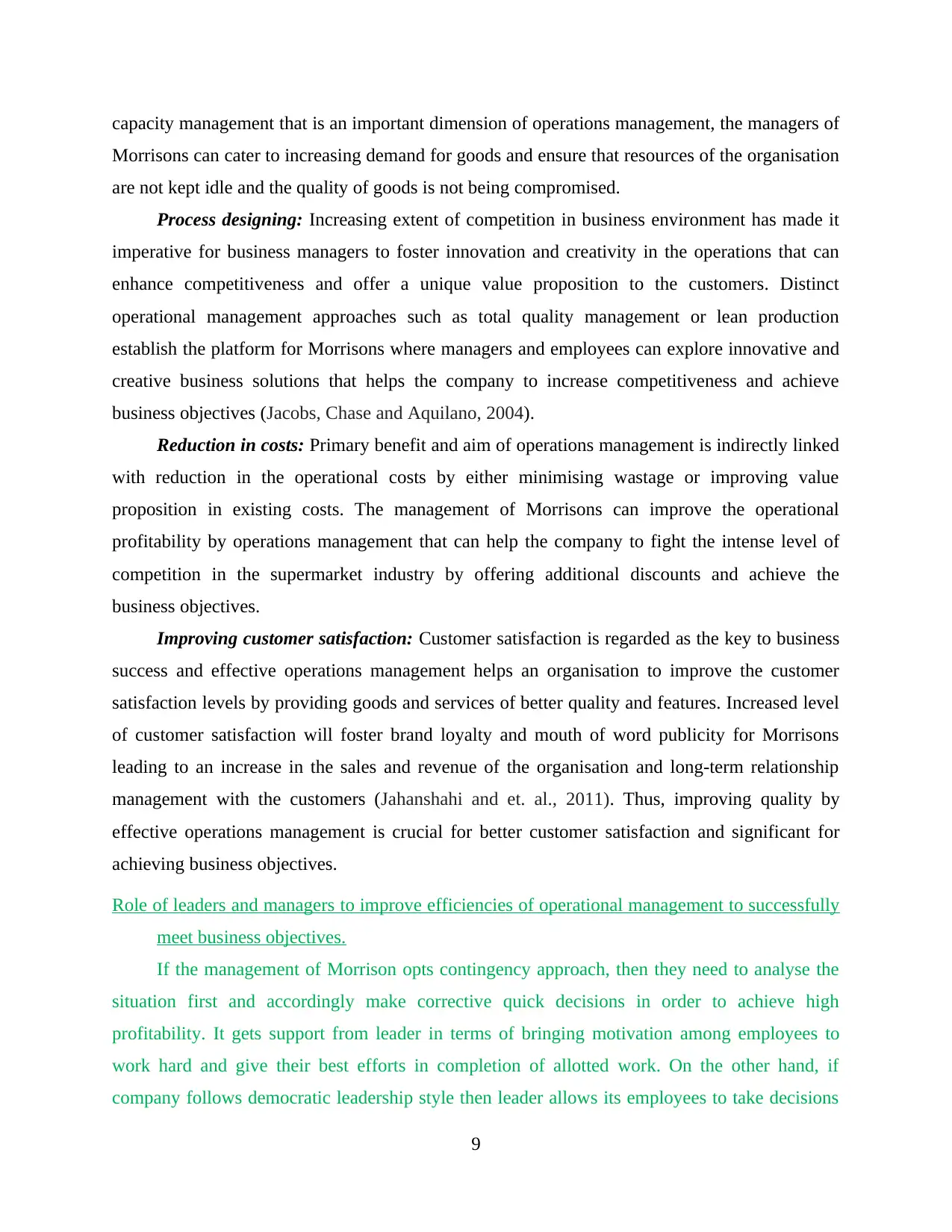
capacity management that is an important dimension of operations management, the managers of
Morrisons can cater to increasing demand for goods and ensure that resources of the organisation
are not kept idle and the quality of goods is not being compromised.
Process designing: Increasing extent of competition in business environment has made it
imperative for business managers to foster innovation and creativity in the operations that can
enhance competitiveness and offer a unique value proposition to the customers. Distinct
operational management approaches such as total quality management or lean production
establish the platform for Morrisons where managers and employees can explore innovative and
creative business solutions that helps the company to increase competitiveness and achieve
business objectives (Jacobs, Chase and Aquilano, 2004).
Reduction in costs: Primary benefit and aim of operations management is indirectly linked
with reduction in the operational costs by either minimising wastage or improving value
proposition in existing costs. The management of Morrisons can improve the operational
profitability by operations management that can help the company to fight the intense level of
competition in the supermarket industry by offering additional discounts and achieve the
business objectives.
Improving customer satisfaction: Customer satisfaction is regarded as the key to business
success and effective operations management helps an organisation to improve the customer
satisfaction levels by providing goods and services of better quality and features. Increased level
of customer satisfaction will foster brand loyalty and mouth of word publicity for Morrisons
leading to an increase in the sales and revenue of the organisation and long-term relationship
management with the customers (Jahanshahi and et. al., 2011). Thus, improving quality by
effective operations management is crucial for better customer satisfaction and significant for
achieving business objectives.
Role of leaders and managers to improve efficiencies of operational management to successfully
meet business objectives.
If the management of Morrison opts contingency approach, then they need to analyse the
situation first and accordingly make corrective quick decisions in order to achieve high
profitability. It gets support from leader in terms of bringing motivation among employees to
work hard and give their best efforts in completion of allotted work. On the other hand, if
company follows democratic leadership style then leader allows its employees to take decisions
9
Morrisons can cater to increasing demand for goods and ensure that resources of the organisation
are not kept idle and the quality of goods is not being compromised.
Process designing: Increasing extent of competition in business environment has made it
imperative for business managers to foster innovation and creativity in the operations that can
enhance competitiveness and offer a unique value proposition to the customers. Distinct
operational management approaches such as total quality management or lean production
establish the platform for Morrisons where managers and employees can explore innovative and
creative business solutions that helps the company to increase competitiveness and achieve
business objectives (Jacobs, Chase and Aquilano, 2004).
Reduction in costs: Primary benefit and aim of operations management is indirectly linked
with reduction in the operational costs by either minimising wastage or improving value
proposition in existing costs. The management of Morrisons can improve the operational
profitability by operations management that can help the company to fight the intense level of
competition in the supermarket industry by offering additional discounts and achieve the
business objectives.
Improving customer satisfaction: Customer satisfaction is regarded as the key to business
success and effective operations management helps an organisation to improve the customer
satisfaction levels by providing goods and services of better quality and features. Increased level
of customer satisfaction will foster brand loyalty and mouth of word publicity for Morrisons
leading to an increase in the sales and revenue of the organisation and long-term relationship
management with the customers (Jahanshahi and et. al., 2011). Thus, improving quality by
effective operations management is crucial for better customer satisfaction and significant for
achieving business objectives.
Role of leaders and managers to improve efficiencies of operational management to successfully
meet business objectives.
If the management of Morrison opts contingency approach, then they need to analyse the
situation first and accordingly make corrective quick decisions in order to achieve high
profitability. It gets support from leader in terms of bringing motivation among employees to
work hard and give their best efforts in completion of allotted work. On the other hand, if
company follows democratic leadership style then leader allows its employees to take decisions
9
⊘ This is a preview!⊘
Do you want full access?
Subscribe today to unlock all pages.

Trusted by 1+ million students worldwide
1 out of 17
Related Documents
Your All-in-One AI-Powered Toolkit for Academic Success.
+13062052269
info@desklib.com
Available 24*7 on WhatsApp / Email
![[object Object]](/_next/static/media/star-bottom.7253800d.svg)
Unlock your academic potential
Copyright © 2020–2026 A2Z Services. All Rights Reserved. Developed and managed by ZUCOL.





